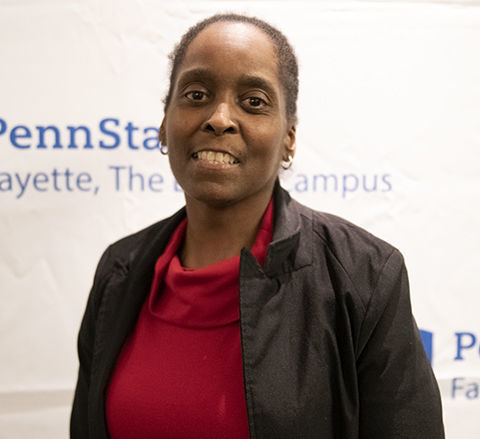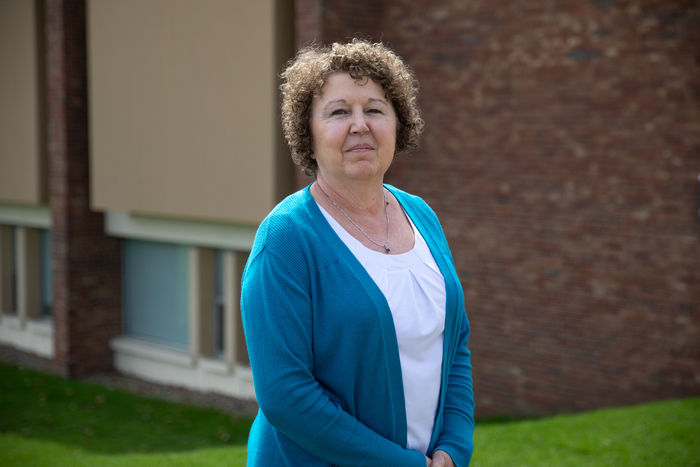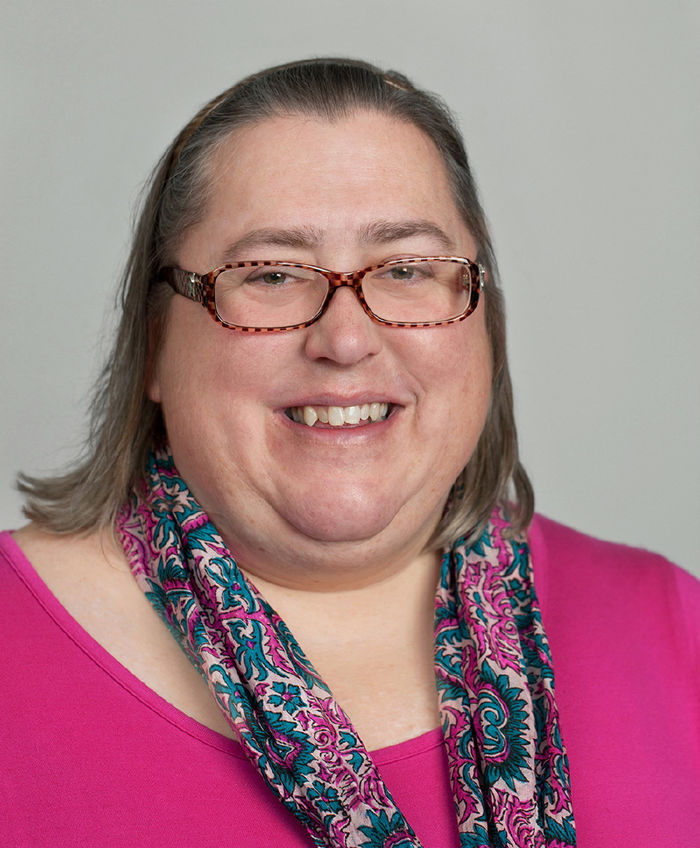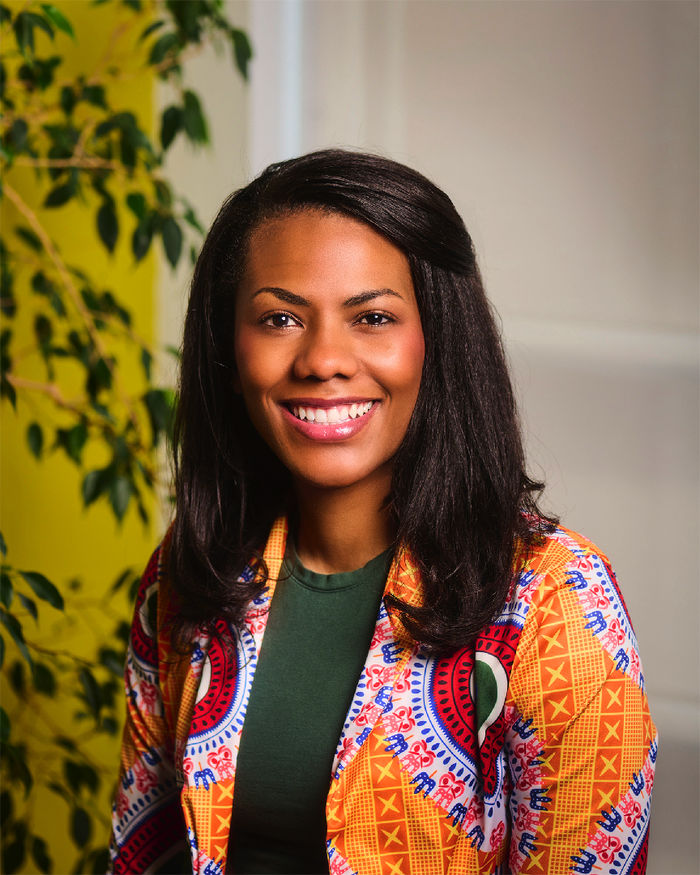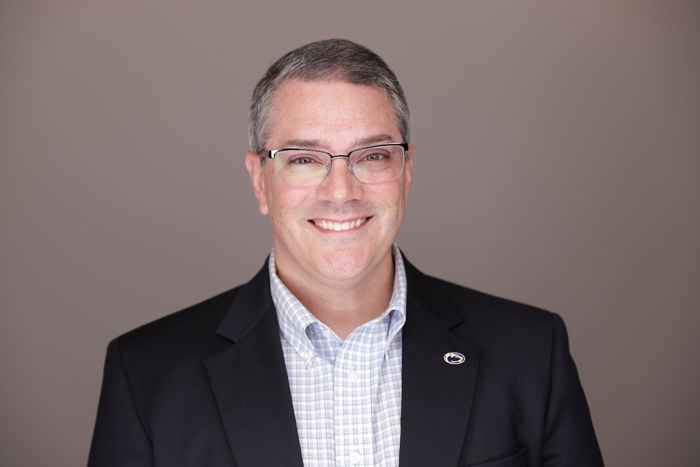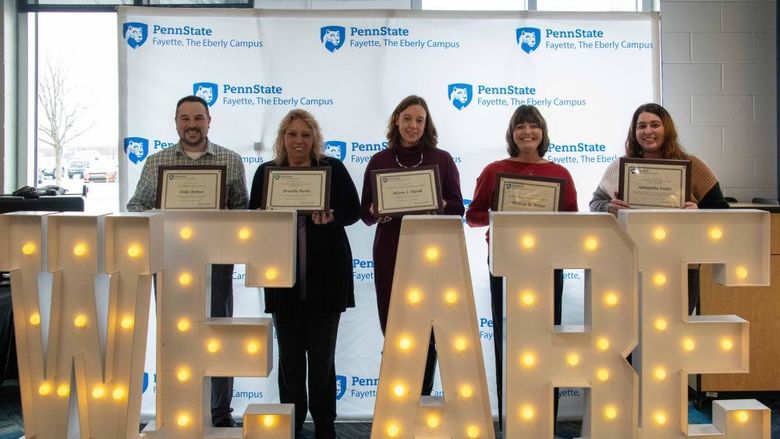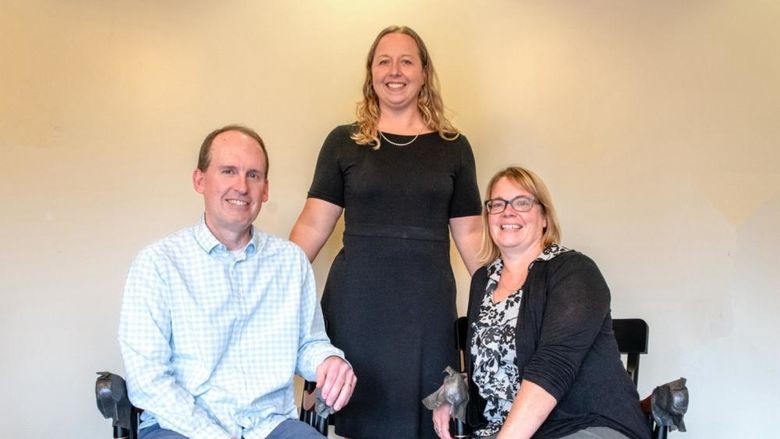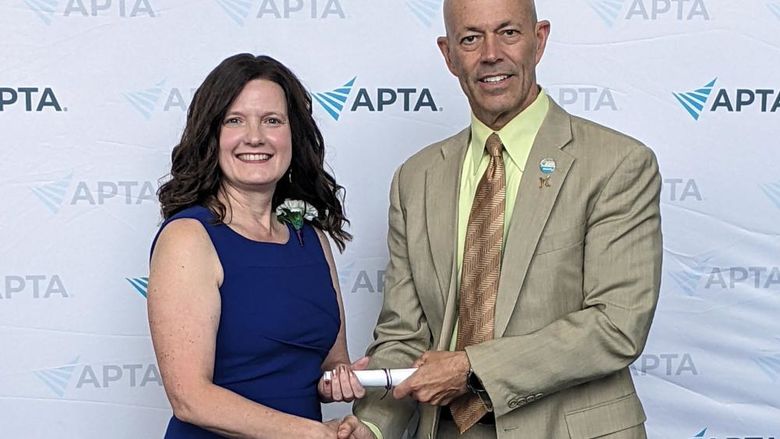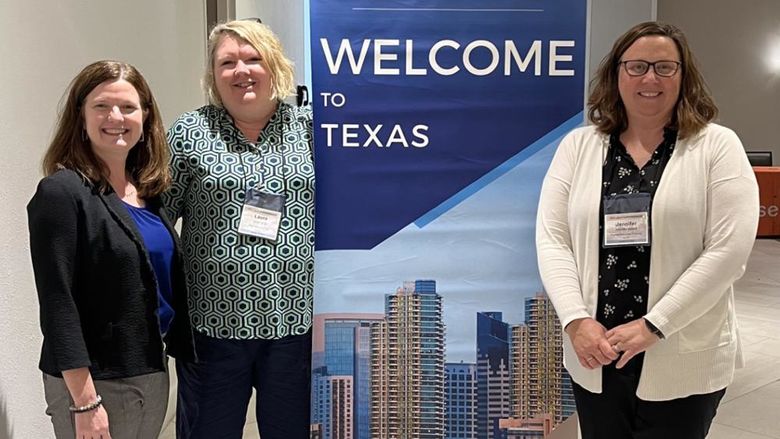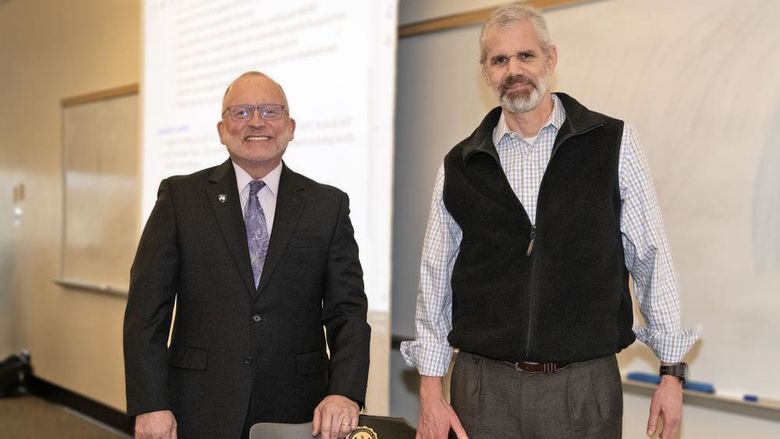UNIVERSITY PARK, Pa. — Six Penn State faculty members have received the 2022 George W. Atherton Award for Excellence in Teaching.
They are Carol Evans, lecturer of biology at Penn State Fayette, The Eberly Campus; Lauren Kramer, associate teaching professor of kinesiology in the College of Health and Human Development; Debra Majetic, assistant teaching professor of radiological sciences at Penn State New Kensington; Heather McCune Bruhn, assistant teaching professor of art history in the College of Arts and Architecture; Ashley Patterson, assistant professor of education in the College of Education and Eric Robbins, assistant teaching professor of finance at Penn State Behrend.
The award, named after Penn State’s seventh president, honors excellence in teaching at the undergraduate level.
Carol Evans
Evans, who teaches biology, environmental science, and anatomy and physiology to primarily non-science majors, said she wants to support all learners throughout their academic journey. She strives to create an environment where students are stimulated and challenged while feeling free to take risks.
“When students take ownership of the possibility that everyone can learn, they become empowered and motivated to discover how they learn best,” Evans said. “Furthermore, this establishes an environment where students become confident to work together and share their knowledge with other students.”
Evans wants the experience to be interactive. She knows that’s how students learn best so she explores various learning styles while including relevant hands-on activities. She wants her students to be problem solvers, critical thinkers and self-directed learners. She said this approach leads her students to begin to understand the fundamentals behind the theories, concepts, processes and mechanisms critical to understanding anatomy and physiology.
Evans is always looking for ways to keep the material relevant. She reaches out to employers within the surrounding community – many of her students are nursing majors – to see which skills will offer students the most benefit as they begin their careers.
Evans wants her students to be successful in the classroom but also lifelong learners who use what they learn at Penn State to approach all they do with a fresh perspective. That’s why she encourages them to be active on campus by attending various cultural and diversity events. She wants her students to be more aware of the world around them and less shy about sharing their voice.
Evans said she too is always learning.
“I personally model that learning is a continuous process by engaging in ongoing professional learning, encouraging peer reviews and critical self-reflection,” Evans said. “Additionally, I work collaboratively with colleagues to learn, share and develop new teaching strategies. Taken altogether, I am dedicated to the development of all students and the college community. My enthusiasm and commitment to teaching continues to grow as I adapt and use best practices to facilitate student learning and achievement.”
Nominators said Evans is a driving force behind diversity and inclusion initiatives on campus. She organized the campus diversity forum and diversity movie series; advises the Multicultural Student Association; organized and planned professional development workshops around diversity, inclusion, and equity; and initiated a professional development workshop series for the entire campus community.
Nominators called Evans a dedicated educator who always has time for her students.
“Evans cares about her students above and beyond their academics,” a nominator said. “Teaching isn’t just her job; it’s her calling! So many students will share their excitement about how they enjoy taking her classes.
Evans’ students praised her passion for teaching and for her tireless commitment to ensuring their success.
“Professor Evans is not only a teacher for her students, but she is a mentor,” a former student said. “She has been there for me since my first year of college, along with my junior classmates. She has always been able to help us with any issue we have had, whether that be our education or our personal lives.”
Lauren Kramer
Kramer said her teaching philosophy is centered around two basic tenets: challenging students to learn and to achieve to the best of their abilities and offering a positive environment that’s conducive to the learning process. It’s important that she gives students the scientific background that will enable them to excel in clinical practice. Her students will primarily work in an allied health care field, so she wants them to leave with the skills they need to adapt and make great decisions in their chosen field.
Her learning tools include lectures, hands-on laboratories, passages from professional journals, writing assignments and group discussion. Kramer also incorporates technology in the classroom and she’s in tune with new teaching strategies that are born from new technologies. With the goal of wanting students to become active learners who can apply their education in a clinical setting, Kramer recently began incorporating cadaver and other anatomical simulations to live lectures so that students can be better prepared for what they’ll see clinically as health care professionals.
“I am a team player, extremely adaptable and I can teach a wide variety of courses in both Kinesiology and biological sciences. Teaching anatomy is my primary passion in academia and I hope to be able to increase my knowledge and clinical experience in this area through teaching, advising and maintaining continuing education requirements,” Kramer said. “I look forward to future opportunities at Penn State and sharing my experience with others. The most satisfying feeling is when one of your students one day becomes your peer and thanks you for being the most influential mentor in getting them where they wanted to be.”
Nominators said Kramer has taught 18 different courses to undergraduate students within the college, including four that she created to support the undergraduate education of athletic training, nursing, and pre-professional students preparing for graduate study in healthcare professions. Kramer designed Kinesiology 203: Medical Terminology for Allied Health Professionals, which is often a required prerequisite for application to graduate study in health care professions, yet it didn’t exist in the course offerings at Penn State until 2004. It is now taught through World Campus, many commonwealth campuses and to all students at University Park who wish to pursue a career as an allied health professional.
Nominators said Kramer’s expertise in athletic training resulted in her being invited by the Commission on Accreditation of Athletic Training Education to be a site visitor in the accreditation process for the past five years.
Kramer’s students called her a dedicated educator who always sees the goal of creating great health care professionals in the field. They said her patience, knowledge, sense of humor and clinical background make her an excellent educator. She’s also mentored more than two dozen graduate students and supervised more than 100 undergraduate independent studies over her 22 year career.
“I can think of no one more deserving of a teaching award than Dr. Kramer,” a former student said. “When I picture an extraordinary teacher, I imagine someone that takes initiative and does more than what is expected for the benefit of their students. Dr. Kramer understands that her students have aspirations of becoming physical therapists, physician assistants, doctors, dentists and more. For this reason, she chooses to include clinical applications in her classes. She teaches you not only what the class requires but she then supplements it with clinical applications we may one day use.”
Debra Majetic
Majetic said she entered the realm of education to make a difference and immediately found it rewarded. But, she said, it’s not what she takes from the classroom, rather the experiences and knowledge her students gain as they enter careers in radiology.
She wants her students to develop the critical and analytical skills necessary to succeed in often difficult situations they’ll face in their careers. She accomplishes this by immersing them in real-world exercises.
In one example, she has her students simulate blindness. One student wears a blindfold while another leads the student across campus.
“The students develop a sense of empathy for, and also the importance of specific instructions for each patient they will care for,” Majetic said.
She insists her students ask the “why” and not just the “how” of learning. With that, she said, they’ll be empowered to take ownership of their education.
Although radiology is a science, she said imagination and creativity are still essential. She strives to be imaginative and creative in the classroom so that her students can think outside of conventional boundaries. As students begin working with patients at hospitals and outreach centers less than a month into the program, Majetic parallels the real-world experiences with practice of theoretical concepts in simulation labs on campus. She said students learn early on the seriousness of their training.
Majetic said she’s driven to succeed because she knows she is training the next generation of professionals and educators in a critical field.
“I fervently believe that teaching is an important service that I provide and a passion of which I am most proud,” Majetic said. ”I learn as much from my students as they learn from me. I take pride in the fact that each day I am collaborating with students and helping to educate a new generation of health care providers in the field of radiology to function knowledgeably in a rapidly changing field with many technological advances.”
Nominators said Majetic is a great educator who relies on her creativity in the classroom, attention to detail in the hands-on application of learning and her commitment to the growth of students both inside and outside the classroom. They praised her concern for student development in the medical field.
“Majetic commits her energy to make sure students are prepared for challenges of radiology but also helps them become good people,” a nominator said. “She extends her time to support them in their journey as students but also supports them as they transition into careers in the field. She works one-on-one with students to allow them to reach their full potential in radiological science.”
Students praised Majetic’s commitment to their education, even during difficult times during the COVID-19 pandemic. They said she increased her time for them and became an even stronger mentor all while continuing the quality of their education.
One former student said he has her to thank for early successes in his career.
“Majetic produces true leaders in the field of radiology,” a former student said. “It is because of her knowledge and leadership that surgeons request me to assist during their procedures and other departments are interested in me cross training for additional modalities to become a part of their team. Majetic teaches the patient care skills and examination techniques that allow her students to stand out. She is definitely a key figure in what makes Penn State the leading university that it is.”
Heather McCune Bruhn
McCune Bruhn says she struggles with the popular notion that art history is an impractical major and unlikely to lead to a career. The idea that visual literacy isn’t deemed as important amazes her given the number of images the average person sees every day. She said it’s crucial students learn to critically interrogate these pervasive images rather than be passive viewers. It’s common, she says, for students to comment that they see the world differently after taking one of her courses.
McCune Bruhn sees education as a way to empower her students. Her goal is to challenge her students while setting them up to succeed. She knows students learn from their mistakes so she’s quick to give them second chances.
She turns mistakes into learning opportunities.
“When a student makes a mistake on an exam or project that could have major consequences for their final class grade, I give them the opportunity to rewrite and recover the lost points,” McCune Bruhn said. “The chance for redemption comes with the invitation to meet in person or by Zoom to discuss what went wrong and how to fix it. Education should be redemptive. It should challenge students appropriately based on their capabilities and the level of the material, but it should ultimately give them the opportunity to succeed.”
Most of her students are Penn State World Campus students so she knows they face many challenges outside of their education such as employment, child care, military obligations and other duties.
Her classes rely on several analytical tools, which she admits can be daunting. She uses visual guides, downloadable glossaries and diagrams for key concepts and low-stakes quizzes to test their newfound skills. They’re skills they can take with them.
“The end result is that students feel confident that they can encounter and evaluate new and unfamiliar works, and I love reading emails about their first-time visits to museums and archaeological sites,” McCune Bruhn said.
Knowing one size doesn’t fit all in education, McCune Bruhn said she mixes up her approach in the classroom. Her classes are filled with reading, quizzes and lectures. But she also utilizes videos, visual tutorials and demonstrations. She said she’s constantly searching for ways to improve communication with her students.
Nominators said McCune Bruhn developed the department’s first online courses several years ago, which greatly opened up art history to distance-learners. They said she followed that up by finding ways to stay engaged with these students.
“It is thanks to her that so many students who might not otherwise have access to classes in art history are able to gain this knowledge and experience,” a nominator said. “She’s especially responsive to the needs of distance-learners. She is available to students via message boards, email, and chat and always includes content that will resonate with adult learners, working students, returning students and members of the armed services who are pursuing their education while deployed.”
Students praised McCune Bruhn’s commitment to their education and her passion for art history. They fed off her enthusiasm and ability to relate art history to everyday images seen today.
“She is passionate about the material she teaches, and that makes it much more engaging for the students. Seeing her get excited about the lecture makes me excited to learn about the topic we are covering,” a former student said. “She encourages conversation and makes the most out of class time. Professor McCune Bruhn teaches us with a goal to better understand art history, rather than to just prepare us for a test. All around she’s a wonderful professor, and I would recommend her course to anyone.”
Ashley Patterson
Patterson says her primarily goal is to build meaningful relationships with her students. She said the little things – like quickly learning students’ names, actively listening and encouraging them to open up – can have a lasting impact on their engagement.
“Once human-to-human relationships have been established, a classroom culture of social and emotional safety within which students feel comfortable taking risks can also be built,” Patterson said. “Such an environment affords opportunities for difficult dialogue and courageous conversations to take place around topics such as racially and economically related educational disenfranchisement. As an important part of maintaining safety in the classroom space, I expect students to be willing to challenge, rethink, or abandon some of the normalized ways in which they have come to think that do not serve the inclusive goals of education.”
Patterson said it’s important to be up front with students on course learning objectives. She’s frequently giving micro-assessments. These assessments let her gauge how well students are grasping core concepts while giving her a blueprint for reasonable challenges that advance their skill sets.
She also relies on multiple means of communication, since not all students learn with the same approach.
“I also value student voice in the classroom; I seek out and create instances for peers to learn from one another and for myself to learn from students as well,” Patterson said.
Simply understanding the material isn’t enough for Patterson’s students. Because they’ll go on to be educators themselves, they need a commanding attention so they can experiment and be creative in adjusting the ways they’ll convey that content to meet the needs of diverse students.
Patterson said education is the most effective means of eliminating ignorance that leads to inequality. She said teachers can be an overwhelmingly effective means for effecting social change. She aims to inspire her students to be lifelong learners who critically self-reflect, hone their skills and expand their worldviews.
“Each individual touched by such an educator moves society closer to a world where differences of race, ethnic background, gender, class, sexuality, ability, linguistic diversity, geographic location and other identity markers can be celebrated unconditionally,” Patterson said.
Colleagues praised Patterson for her passion for helping students become better educators. They also lauded her recent efforts to advance equity education in classes for undergraduate engineering students. Her unwavering support, they said, improved teaching equity and social justice for engineering educators.
“Through all of our observations and interactions with Dr. Patterson, she consistently shows passion for helping current and future educators in creating educational environments that put the student first,” a nominator said. “We are fortunate to have the support and expertise of Dr. Patterson as a colleague, but more importantly as she endeavors to train the next generation of teachers at Penn State.”
Students said Patterson immediately makes her presence known and begins each semester with one-on-one meetings to get to know her students, their passions and their career goals.
“Dr. Patterson is the quintessential example of a professor who consistently goes above and beyond to care for her students in the best possible way,” a former student said. “Whether it is through careful and responsive planning and teaching or putting genuine time and effort into knowing her students as people, Dr. Patterson makes Penn State a better institution and deserves to be recognized for her far reaching impact.”
Eric Robbins
Robbins says he’s passionate about teaching investment-related concepts and believes that passion helps that content come alive. He encourages students to be curious learners in an atmosphere he creates that promotes experiential learning.
Robbins uses classroom lectures as a starting point for students to further advance new information in both in- and out-of-class learning exercises that foster an environment of discovery-based learning.
“As students apply classroom learning in a way that replicates real life, their interest levels and self-motivation increase more rapidly,” Robbins said. “I routinely make an effort to work with students one-on-one when they express curiosity on a concept that is related to my expertise even when it is not directly covered in my classes.”
Lectures and exercises aren’t enough, Robbins said. He said students do their best when they’re getting their hands dirty and applying what they know to real-world situations. That’s why he uses simulations on stock market trading, Securities and Exchange Commission filings and retirement planning to get students acquainted with tools that will be commonplace in their careers. He’s even secured deals with industry so that his students have access to the latest tools.
In further ties to industry, Robbins brings in guest speakers. His students are also doing a case study with the help of a major financial planning firm in Pittsburgh.
Robbins teaches both residential and distance learning courses. He’s learned strategies that worked from one group and found ways to apply it to the other. For example, his distance-learners give feedback on the “muddiest points” of a lesson. He uses this feedback to improve the online and residential content presentations.
Robbins said he himself is always learning and feedback gives him a chance to improve.
“I believe that I should be in a state of continuous improvement to both set an example for my students and to benefit them directly at the same time,” Robbins said. “I make an explicit effort to attend workshops, take online training, and read books that will help me improve in both pedagogical and practical skills.”
Nominators said Robbins is dedicated to creating opportunities for students to use their skills outside the classroom. He’s faculty leader for the Business Analytics Team and started a program called Finance Day.
“Finance day is another key program which has helped foster a deeper understanding,” a nominator said. “It brings together different professionals from all sorts of financial jobs to come and explain what that specific job entails and gives students an opportunity to network and ask questions. Through being involved in such extracurricular programs, Robbins fosters a relationship with students where he is both a mentor and a friend.”
Students praised Robbins for always applying what they learned into the classroom to real-life scenarios. They said he is always seeking to alert them of opportunities for personal growth.
“Robbins cares about his work and about his students because of the effort he makes to communicate with them,” a former student said. “It is a rare week that I do not receive emails about career opportunities and finance-related opportunities specifically meant to help students learn outside the classroom and prepare for the real world.”
